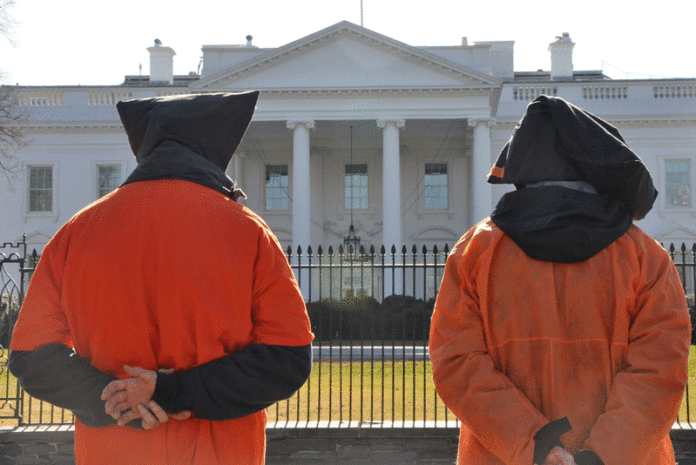As President Obama scrambles to release captives from the U.S. military prison in Guantanamo Bay, Cuba his own intelligence advisers reveal that a growing number of inmates freed from the compound reengage in terrorism.
This is nothing new and in fact, has been documented over the years in various government assessments but this latest information comes in the midst of a frenzy to clear out the maximum security facility in order to realize the president’s longtime dream of closing it.
A new report released this month by the Office of the Director of National Intelligence (ODNI) shows that of the 161 Gitmo detainees released by the Obama administration, nine are confirmed to be “directly involved in terrorist or insurgent activities.”
The ODNI, the broad agency that serve as an umbrella for the intelligence community and advises the president, also writes that 113 of the 532 Gitmo captives released during the George W. Bush administration have engaged in terrorist activities. This demonstrates that recidivism among this demographic is hardly earth-shattering news yet the administration keeps releasing more and more captives from the facility at the U.S. Naval base in southeast Cuba.
The ODNI further reveals that at least two prisoners released from Gitmo by Obama and two others released by Bush have returned to “terrorist activities” during the first half of this year alone. “Based on trends identified during the past eleven years, we assess that some detainees currently at GTMO will seek to reengage in terrorist or insurgent activities after they are transferred,” according to the ODNI, which is composed of more than a dozen spy agencies, including Air Force, Army, Navy, Treasury and Coast Guard intelligence as well as the Federal Bureau of Intelligence (FBI) and the Central Intelligence Agency (CIA).
The agency also stated in its report that “former GTMO detainees routinely communicate with each other, families of other former detainees, and previous associates who are members of terrorist organizations. The reasons for communication span from the mundane (reminiscing about shared experiences) to the nefarious (planning terrorist operations). We assess that some GTMO detainees transferred in the future also will communicate with other former GTMO detainees and persons in terrorist organizations.”
Various government agencies have been documenting this for years. Back in 2009 the Department of Defense (DOD) reported a rise in the number of Gitmo detainees who rejoined terrorist missions after being released. At the time the Pentagon’s Defense Intelligence Agency, which gathers foreign military intelligence, disclosed that the number of Gitmo prisoners that returned to “the fight” since their release from custody nearly doubled in a short time from 37 to 61.
The agency used data such as fingerprints, pictures and other intelligence reports to confirm the high rate of recidivism among released prisoners. By then around 500 had been transferred to other countries though defense officials maintained that most should never have been released because they pose a serious threat to the United States.
A perfect example is an Al Qaeda operative who was put on a global terrorist list a few years after the U.S. released him from Gitmo. Embarrassingly enough, the U.S. government even offered a $5 million reward for information on his whereabouts. The Saudi national, Ibrahim al-Rubaysh, was repatriated back home under a Saudi Arabian “rehabilitation” program that supposedly reformed Guantanamo Bay jihadists but instead has served as a training camp for future terrorists.
In fact, in 2008 counterterrorism officials confirmed that many of the terrorists who return to “the fight” after being released from U.S. custody actually graduated from the laughable Saudi rehab program, which started under Bush and continued under Obama.
In an effort to stop Obama from releasing more terrorists, a congresswoman from Indiana recently introduced legislation that would temporarily halt the transfer of Gitmo detainees. The House passed the measure last week by a 244-174 vote but it’s highly unlikely to get approved by the Senate, and even if it does, Obama will most certainly veto it. The lawmaker behind the bill, Jackie Walorski, said the president’s plan to close Gitmo is “reckless” and “puts American lives at risk.”





























